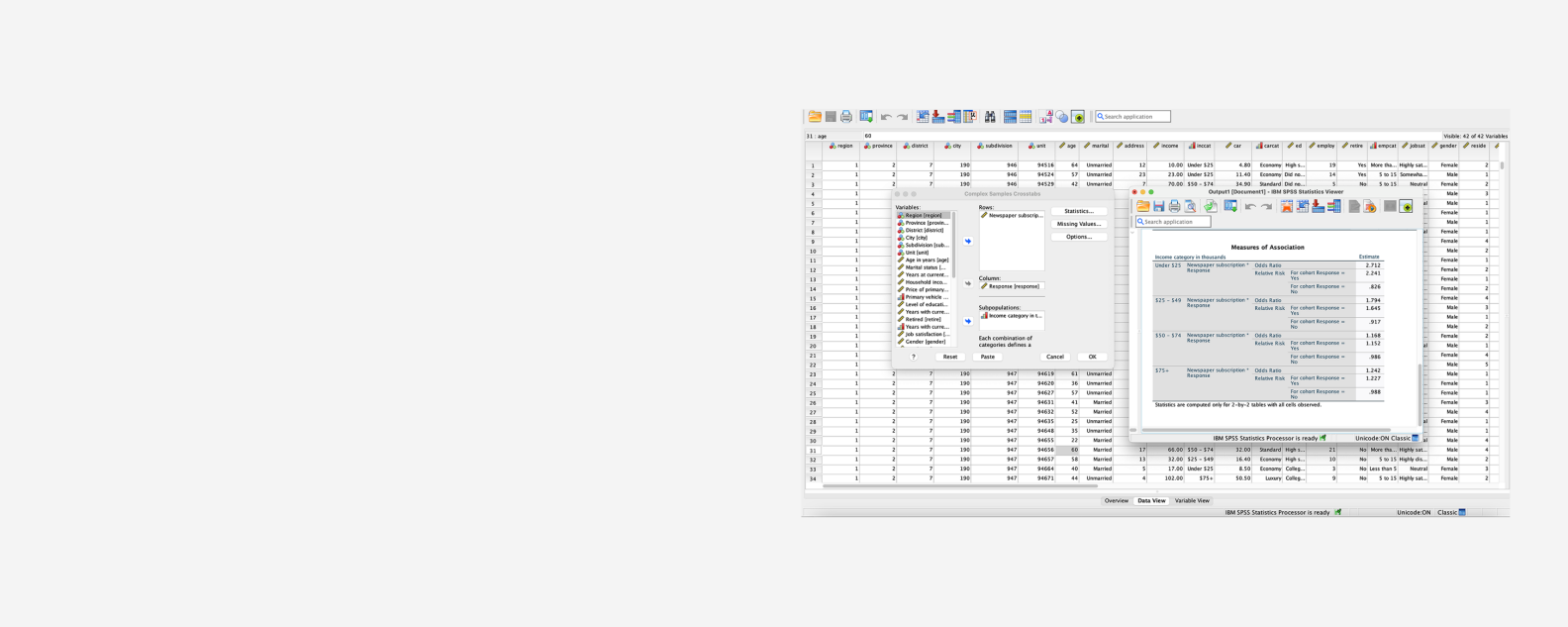
IBM® SPSS® Complex Samples software can compute statistics and standard errors from complex sample designs by incorporating the designs into survey analysis. This solution helps you produce a more accurate picture by allowing subpopulation assessments to consider other subpopulations.
SPSS Complex Samples offers planning tools such as stratified, clustered or multistage sampling. It's designed to help you reach correct point estimates, predict numerical and categorical outcomes from nonsimple random samples, and account for up to three stages when analyzing data from a multistage design. This module is included in the SPSS premium package and available at an additional cost for the base, standard and professional packages.
Increase the precision of your sample or ensure a representative sample from key groups. Employ multistage sampling to select a higher-stage sample.
Retain survey planning parameters. Publish data sets and reuse plans as templates. Select clusters or groups of sampling units to make surveys more cost effective.
Display one-way frequency tables or two-way cross-tabulations. Build linear regression with ANOVA and ANCOVA. Estimate means, sums, ratios and more.
Use helpful wizards to specify how samples are defined and standard errors estimated; define schemes and draw samples. Select complex, probability-based samples from a population.
Start with one of the wizards. Then use the interactive interface to create plans, analyze data and interpret results. Each plan acts as a template and allows you to save decisions. Then use the procedures specifically developed for complex samples to predict numerical, ordinal and categorical outcomes or time to a specific event.
Predict categorical outcomes (for example, who is most likely to buy your product) while taking the sample design into account to more accurately identify groups through logistic regression. Ordinal regression: predict ordinal outcomes such as customer satisfaction (low, medium or high). Cox regression: predict time to an event for samples drawn by complex sampling methods. General linear models: predict numerical outcomes while taking the sample design into account.
Have an intuitive sampling wizard guide you through the process of designing and drawing a sample. The analysis preparation wizard helps prepare public-use data sets for analysis, such as the National Health Inventory Survey data from the Centers for Disease Control and Prevention (CDC).
Increase the precision of your sample or help ensure a representative sample from key groups by choosing to sample within subgroups of the survey population through stratified sampling . Clustered sampling: select clusters—groups of sampling units. Multistage sampling: select an initial sample based on groups of elements in the population; then create a second-stage sample by drawing a subsample from each selected unit in the first-stage sample.
Compare SPSS Statistics two deployment options; traditional license or subscription version. This module is part of the SPSS Statistics traditional license packages. To compare all the various SPSS Statistics packages and learn where this module fits in, visit this page. Note: Modules are only compatible with traditional license versions. The subscription version wraps the same features inside three optional subscription add-ons.
IBM SPSS complex samples requires a valid IBM SPSS Statistics base license.
- Prerequisite: IBM SPSS Statistics
- Processor: 2 GHz or faster
- Display: 1024 × 768 or higher
- Memory: 4 GB of RAM required, 8 GB of RAM or more recommended
- Disk Space: 2 GB or more